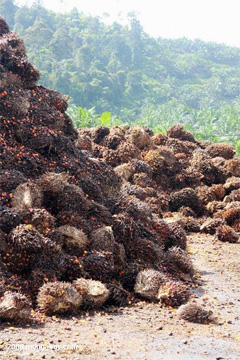British motorists are unwittingly big consumers of palm oil produced on rainforest lands in southeast Asia, reports The Times.
A dozen oil companies provided 123 million liters of palm oil to gas stations around Britain in the year ended April 2009, according to government figures obtained by The Times. 64 million liters came from from Malaysia, 27 million came from Indonesia, and 32 million came from unspecified countries.
“Only 15 per cent of the palm oil came from plantations that met any kind of environmental standard,” writes Ben Webster, the author of the article. “Much of the rest came from land previously occupied by rainforest.”
 Pile of oil palm fruit bunches in Malaysia. Oil palm generates more oil per unit of land than any other conventional crop. |
Environmentalists say that expansion of oil palm plantations is driving large-scale destruction of tropical forests in Indonesia and Malaysia, putting endangered species like the orangutan at risk and fueling massive greenhouse gas emissions. The palm oil industry maintains its crop has lower emissions than European-sourced biofuels, provided it is not grown in place of carbon-dense rainforests and peatlands. The industry is now working with some environmental groups to develop a certification scheme that ensures more responsible production.
Shell Oil told The Times it did not use any palm oil last year because it couldn’t find a sustainable source. But the company says it will use palm oil in the future, provided it is environmentally sound.
“It is almost inevitable that we will use palm oil because the amount of biofuel we will need is increasing,” Luis Scoffone, vice-president for biofuels, told The Times. “Palms deliver one of the highest volumes of oil per hectare of any crop. That means we can use less land to produce the same amount of oil.”
Oil giants destroy rainforests to make palm oil diesel for motorists.














